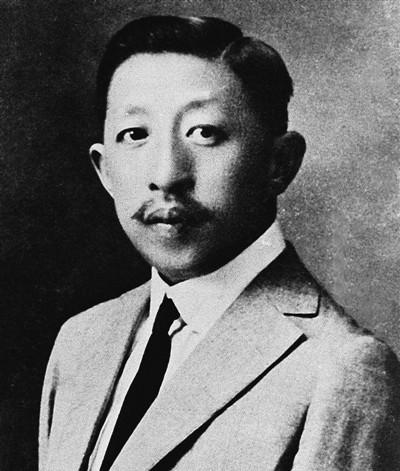<col>

"'The heaviest thing in life is the spirit, and the spirit is new day by day,' this is a sentence in Mr. Liao Zhongkai's farewell poem "Tips to Wake Up Women, Cheng'er" written to his children in prison." At the Liao Zhongkai He Xiangning Memorial Hall, Xie Siting, a post-90s college student who has been a part-time docent at the university for four years, is introducing it to the visitors with great emotion.
Liao Zhongkai He Xiangning Memorial Hall is located in the "Zhongkai Agricultural and Industrial School" founded in memory of Mr. Liao Zhongkai, which has developed from a secondary school into an undergraduate university , Zhongkai Agricultural Engineering College. The museum collects precious historical materials of the modern Chinese democratic revolutionaries Liao Zhongkai He Xiangning and his sons and daughters Liao Chengzhi and Liao Mengxing and their families who have been the successors of the Chinese nation for the rejuvenation of the Chinese nation.
Liao Zhongkai (1877-1925), formerly known as Enxu, Yibai, Zhongkai, a native of Huiyang County, Guangdong Province, was a modern Chinese democratic revolutionary and leader of the Left Wing of the Chinese Kuomintang.
In 1903, Liao Zhongkai and his wife He Xiangning traveled east to Japan to study, seeking a way to save the country and save the people. The two became acquainted with the great pioneer of the democratic revolution, Sun Yat-sen, in Tokyo, Japan, and have since firmly followed Sun Yat-sen and devoted themselves to the torrent of the democratic revolution.
In 1905, Liao Zhongkai and his wife assisted Sun Yat-sen in establishing the Chinese League, and Liao Zhongkai served as deputy accounting officer and deputy director of the Ministry of Foreign Affairs at the headquarters of the League. Their home in Tokyo also became a liaison station and meeting place for Sun Yat-sen and other revolutionaries.
In August 1922, Sun Yat-sen met with communist leader Li Dazhao and representatives of the Soviet envoy Yue Fei, and resolved to unite with the Russian Communist Party and accept the proposal to reorganize the Kuomintang. Liao Zhongkai was twice ordered to go to Japan to hold talks with Viet Fei, and played a crucial role in the process of kuomintang reorganization.
In February 1923, after Sun Yat-sen returned to Guangzhou to resume his tenure as Grand Marshal of the Republic of China Army and Navy, Liao Zhongkai successively served as the finance minister of the base camp and the governor of Guangdong Province, and fully assisted Sun Yat-sen in the reorganization of the Kuomintang.
In January 1924, the First National Congress of the Chinese Kuomintang was held in Guangzhou. After the meeting, Liao Zhongkai was appointed as a member of the Central Executive Committee and concurrently served as the director of the Workers Department of the Central Party Department and the Minister of Agriculture, and in February he was appointed acting chairman of the Preparatory Committee of the Whampoa Military Academy.
After the founding of the Kuomintang, the National Revolutionary Movement flourished throughout the country. Liao Zhongkai attached great importance to the role of the Communist Party of China and the workers' and peasants' movement under its leadership in the National Revolution, and he sincerely cooperated with the Communist Party, faithfully implemented the policy of "supporting peasants and workers", and actively supported the workers' and peasants' movement.
After sun yat-sen's death in March 1925, Liao Zhongkai firmly defended the three major policies of "uniting with Russia, the United Communist Party, and supporting peasants and workers", safeguarded the unity of the Kuomintang and the kuomintang's revolutionary direction, and became the core and banner of the left wing of the Kuomintang after Sun Yat-sen's death. As a result, he was regarded by the right wing of the Kuomintang as a major obstacle to seizing party power and breaking up the cooperation between the Kuomintang and the Communist Party.
On August 20, 1925, Liao Zhongkai was assassinated by a mob raised by the right wing of the Kuomintang on his way to attend a meeting of the Executive Committee of the Kuomintang Central Committee in front of the Central Party Headquarters Building.
Zhuangzhi died before he was paid, and Liao Zhongkai made immortal contributions to the Chinese democratic revolution with his life in his prime. Zhou Enlai praised him as the center of gravity of the Kuomintang and "an active leader of the workers' and peasants' movement and the anti-imperialist movement," and spoke highly of his lofty revolutionary spirit of "fighting hard all his life, revolution for the party, and sacrifice for the country."
In Liao Zhongkai's revolutionary career, He Xiangning always gave him firm support. She once wrote a poem "Farewell" for her husband: "The national vendetta is difficult to die before it is restored, and she can't bear to cry goodbye." Advise the king not to regret the head of the noble, to leave a name in Chinese history. After Liao Zhongkai was killed, He Xiangning endured grief and inherited her husband's unfinished business and continued to struggle to consolidate the revolutionary united front.
Under the education and influence of their parents, Liao Chengzhi and Liao Mengxing threw themselves into the revolution in their youth. Liao Chengzhi participated in the Long March, experienced the War of Resistance Against Japanese Aggression and the War of Liberation, was imprisoned many times and was determined to remain unswerving, and gradually grew into an excellent leader of the party and the country. Liao Mengxing served as Song Qingling's secretary from the anti-Japanese war period and fought on special fronts for a long time.